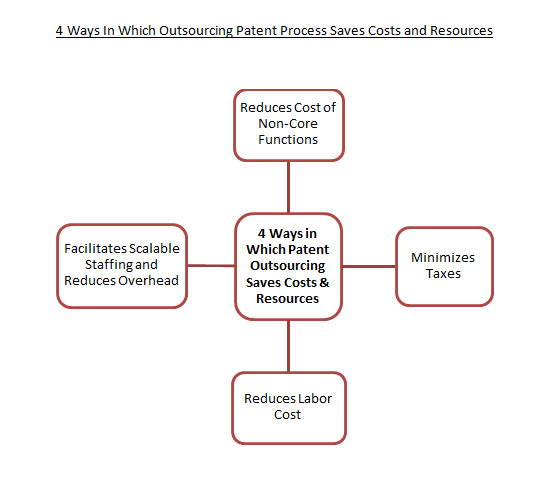4 Ways In Which Outsourcing Patent Process Saves Costs and Resources
From emerging as a trend in the 1980s – to transforming into the most effective business strategy in every domain, outsourcing has become a definitive method to minimize cost and maximize efficiency. In fact, outsourcing has also made inroads in the intellectual property ecosystem, becoming the most cost-effective way of obtaining technical and legal expertise.
Table of Contents
What is Patent Outsourcing?
With time, the IP portfolio and processes surrounding it have grown complex. Businesses have begun to rely on third-party vendor services to achieve efficiency and higher quality outcomes. So, the process of hiring a third-party IP service provider to perform meticulous tasks, such as patent drafting and patent prosecution is called patent outsourcing.
Any business that is developing a notable patent portfolio recognizes the value of outsourcing. Even companies that have in-house IP departments outsource a chunk of the work to third-party IP service providers to reduce cost, facilitate coordination and streamline their workings as a whole. Patent outsourcing is especially beneficial for relatively smaller enterprises with slimmed-down departments.
Therefore, if you are going to hop onto the patent bandwagon, you must know how outsourcing will keep your budget in control and pave the way for a granted patent. Here are 4 ways in which outsourcing does that:

1. Reduces Cost of Non-Core Functions
The patent process involves several non-core tasks such as patent drafting, patent filing, patent prosecution, including opposition and contentious matters. Most IP departments lack the in-house resources to conduct these tasks. Therefore, companies outsource patent filing and patent prosecution mostly to external patent attorneys to preclude systematic errors that can cause significant loss to a patent portfolio.
Patent oppositions and contentious matters can be tedious but also sporadic. So, maintaining an in-house team for patent opposition serves little purpose. In fact, to support in-house personnel for the task can strain the budget. A third-party IP service provider can handle patent opposition at a lower cost because of the sheer scale of services they provide. Outsourcing these functions to skilled professionals as and when required save costs and resources that can be utilized in core functions such as product development and R&D.
2. Minimizes Taxes
Businesses can locate third-party service providers to handle patent services on foreign shores as well – this type of outsourcing is called offshoring. It has become an attractive strategy for businesses because it reduces taxation. Overseas companies enjoy tax exemption or a lower degree of taxation. However, the catch is that the IP has to be maintained and marketed in that foreign country.
Sometimes, offshoring could result in double taxation if revenues taxed in the offshore country are again subject to withholding taxes in the native country. To avoid this, make sure the offshore company is in a country that enjoys a double tax treaty, which ensures non-resident companies are taxed in one country. Such countries include Switzerland, Ireland, Netherlands, Luxembourg and Malta.
3. Reduces Labor Cost
Outsourcing, especially offshoring, usually minimizes labor cost to a great extent. Even if you choose to outsource the patent process to a service provider within the US, the readily available teams of skilled experts invariably cost lesser than hiring and sustaining in-house teams.
4. Facilitates Scalable Staffing and Reduces Overhead
Companies with growing and dynamic patent portfolios need different professionals with different skill sets at varied hours. It is challenging for small and medium enterprises to maintain an in-house team of such caliber at all hours. Outsourcing gives such businesses the flexibility to tailor their staffing capability according to the fluctuating workload. They can quickly scale up or scale down their staff for a specific project, ensuring that overheads do not exert pressure on the company budget.
Conclusion
In this age of lean enterprises, outsourcing the patent process is the most cost-effective way of ensuring a granted patent. With nearly 500,000 patents being filed in the US annually, portfolio management has expanded with several self-contained administrative tasks apart from the significant legal functions. Therefore, outsourcing such tasks to third-party IP service provides not only reduces systematic errors but reduces costs incurred by the company.
-The Editorial Team
Having Queries? Contact Us Now!
"*" indicates required fields




